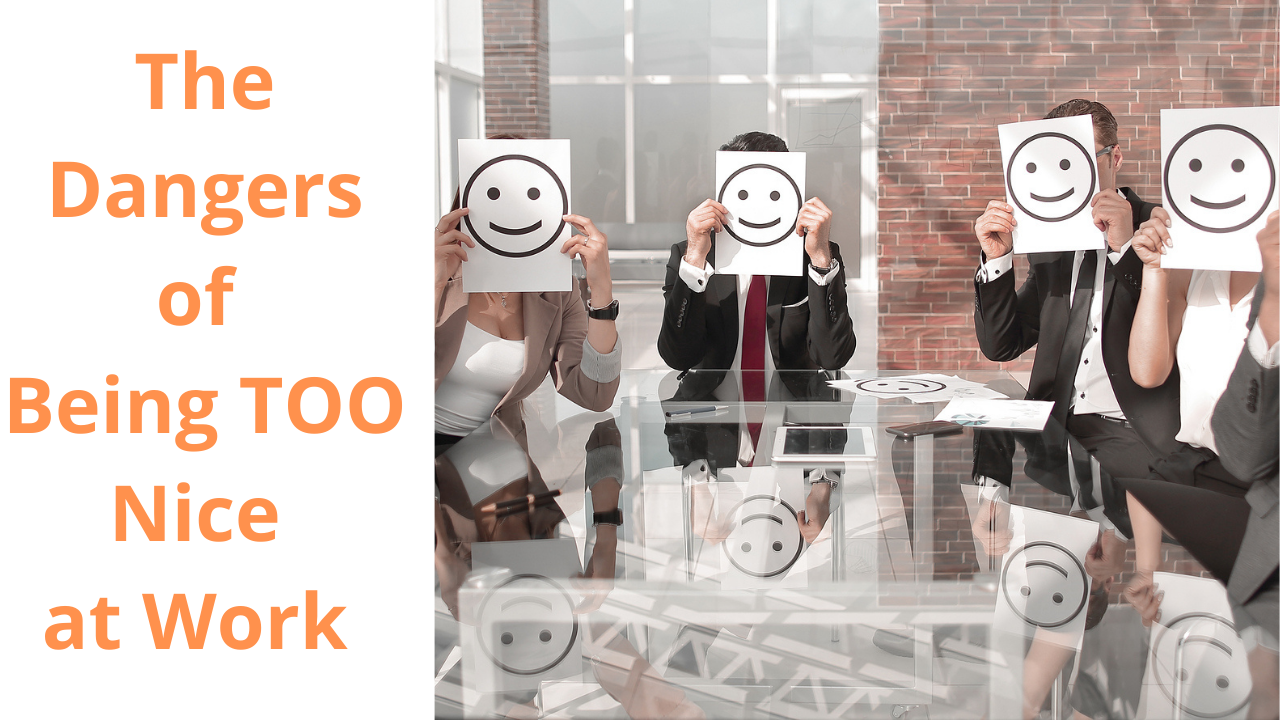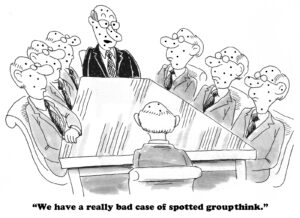Is There a Danger in Creating TOO Nice of a Workplace Culture?
Yes, I’m known as the “Workplace Energizer!” for my enthusiastic championing of positive, fun, inspiring, humor-filled workplaces that drive outrageous results. But…I still recognize there are some dangers associated with a workplace culture where everyone is TOO darned nice! Here are seven real dangers of creating TOO nice a workplace.
Can You Be TOO Nice at Work? (video transcript)
It might seem odd for somebody who is known as the “Workplace Energizer,” for somebody who travels the world writing and speaking about inspiring positive humor-filled workplaces, to talk about the dangers of being too nice.
And we all learned in kindergarten the importance of being nice, playing nice, and we all want to be known as nice people. I want to be known as a nice person. I think I’m a nice person. I know you think you’re a nice person too, and I’m so glad that you think you’re a nice person because yes, it’s important!
But there are some dangers in creating a workplace culture that is too nice. There is a danger in you being too nice at work.
Of course, we need to infuse our workplaces with respect and patience and compassion and kindness and empathy, but there’s a difference between being kind and being nice. There is a difference between demonstrating empathy and being nice. There is a difference even sometimes between being compassionate and being nice. Here are seven dangers of creating a workplace culture that is too darn nice.
#1. If you’re too darn nice, you run the risk of group-think where everybody goes along to get along because you want to play nice in the sandbox. So nobody brings up the elephant in the room. Nobody challenges assumptions, asks challenging questions, or offers opposing ideas. You don’t do the critical thinking you need to do. You don’t engage in passionate debates in your meetings because you want to play nice. And when you fall in that trap of group-think, that is when really dangerous and stupid ideas can happen in your organization. That’s when, as well, you don’t get the best possible idea. You miss out on a really fabulous idea because everybody just wanted to get along and play nice.
#2. You can run the risk of creating so much stress for yourself and even ultimately burning out at work because you don’t know how to say no to anybody because you want to be nice. So you say yes to everybody.
“Sure, I can do that!”
“Yes, I can help you out!”
“Yes, I’d be happy to do that!”
And then all of a sudden, you’re not very happy. You’re a little stressed out because you’ve said ‘yes’ one too many times.
One of the nicest things we can do, one of the kindest, let me rephrase that, kindest things we can do not just for yourself, but for your teammates, is to learn to say no. It is kind to say no. And here’s the mantra I want you to embrace. You need to learn to say no in order to have the energy, the time, to say yes to the things that truly matter at work.
#3. Related to number two, if we’re too darn nice we end up becoming a people-pleaser. And we all want to please people, I get that. But if we become such a people-pleaser that we go out of our way to, again, go along to get along, we end up pleasing everybody perhaps, but ourselves. We end up doing a lot of damage to our own self-esteem, to our morale, by becoming a door mat. Again, we create unnecessary stress in our lives in an effort to be nice to everybody.
#4. If we create too nice a culture nobody ever hears those uncomfortable truths that we all need to hear at work from time to time. And when we don’t hear those uncomfortable truths, we are doing a disservice to one another. We are doing a disservice to the people who need to hear them. You are doing a disservice to your team and to your company because your performance could improve if people only heard the constructive feedback they need to hear. But when we all get so concerned about being nice, we don’t want to rock the boat. We don’t want to have any conflict. And I get it.
Nobody likes conflict.
I don’t like conflict.
But we need to reframe it so we don’t think of it as “conflict.” Successful, rocking teams and workplaces thrive on an atmosphere of open and honest feedback, of open and honest communication. It is one of the kindest things you can do to offer constructive, positive feedback to a colleague, to your boss even. Imagine this: Imagine you’re working in a job and for 12 years you were doing something that was annoying the heck out of everyone, driving your coworkers batty, and nobody came and told you!
Wouldn’t you want to know? Wouldn’t it upset you to find out 12 years later that you were doing this and nobody spoke the truth to you because you didn’t want to hurt your feelings because they want it to be nice?
And meanwhile, your performance suffered, your career suffered, because nobody told you the truth! One of the kindest things we can do is learn to have those difficult, challenging conversations and create that environment that is open to honest and constructive feedback.
#5. People don’t speak up in the face of unsafe work practices because they want to be nice. They don’t want to create conflict in an awkward situation. They don’t want to be seen as the jerk for being the person who speaks up. One of the kindest things you can do at work, I want to suggest, is speaking up in the face of an unsafe work practice. One of the kindest things you can do is to help make sure your colleagues go home safe to their families!
#6. The sixth danger of being too darn nice at work is you tolerate jerky customers. Some of the most customer-centric organizations that I’ve researched around the world embrace the mantra, “No! The customer isn’t always right!” The customer is a bit of a jerk sometimes. The customer in fact can be a major jerk. They send that message out to their employees, that no, we don’t put up with abusive customer service because we care about our employees, we care about your well-being.
So, the customer isn’t always right and we need to be brave enough to fire our customers sometimes. And to send the message, “We don’t need your business!” If you want to be a jerk like that, please go visit our competitors. They’ll be happy to have you, but we are not going to put up with that behavior. If you put up with jerky behavior from your customers, it does a disservice to your employees, it does a disservice to your other customers, and it harms your brand.
#7. We tolerate jerks at work. Perhaps this is the biggest one of them all because we’re so nice at work because we all want to get along at work, so we tolerate the work jerks. As I write in my book, The Jerk-Free Workplace, jerks create an enormous amount of stress. Jerks cost your team and your company far more than you could ever realize.
And too often, in an effort to be nice, we don’t confront the jerks. We don’t deal with them the way we need to deal with them. We don’t have those challenging conversations that we need to have with them. We don’t confront the jerks because we want to be nice and avoid the conflict. And I get it. One of the toughest things we can do in an organization is to let somebody go.
But sometimes, that is the right thing to do. It is the right thing to do for your company. It is the right thing to do for the rest of your teammates. It is the right thing to do for your top performers in your organization, to not tolerate the bottom 5% soul-sucking, fun-sucking jerks.
In fact, look at it this way. It is one of the most unkind things you can do to tolerate those jerks at work. It is one of the most unkind things you can do to NOT do anything about their behavior. It isn’t fair to anybody in your organization to tolerate that behavior! And it’s not kind to them! You’re doing the jerks a disservice too by covering it up, by sweeping their behavior under the rug and not ever dealing with those serious performance issues. It’s not very nice to have to deal with those performance issues, but it’s the kindest thing that we can sometimes do.
So what about you? What do you think about this topic? Does it resonate with you? Does it makes sense? Have I missed something? Are there some other dangers of being too nice at work? Do you buy that there’s a difference between being kind and being nice at work? I would love to hear your comments on this. Please leave a comment in the comment box. And if you haven’t yet joined our growing community, please hit the subscribe button and subscribe to the channel Inspiring Workplaces where are we talk about creating non-jerk-like, positive rocking workplaces that drive outrageous results.
Michael Kerr is a Canadian Hall of Fame business speaker who is known as one of North America’s leading experts on positive workplace cultures. He is the author of 8 books, including, The Jerk-Free Workplace, Hire, Inspire, and Fuel Their Fire, and The Humor Advantage: Why Some Businesses Are Laughing All the Way to the Bank.






